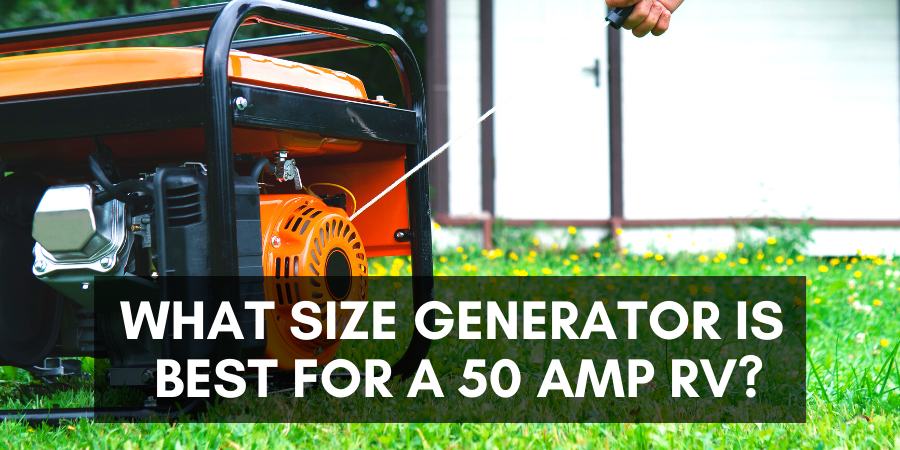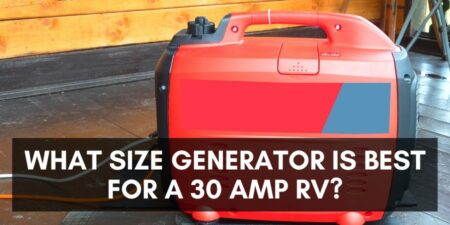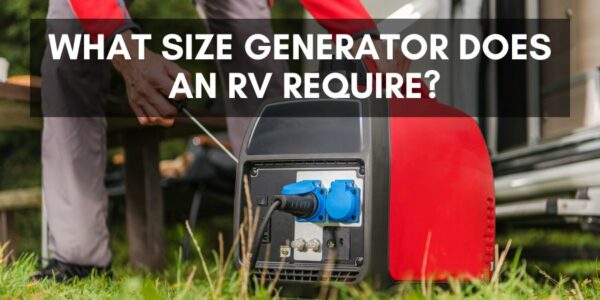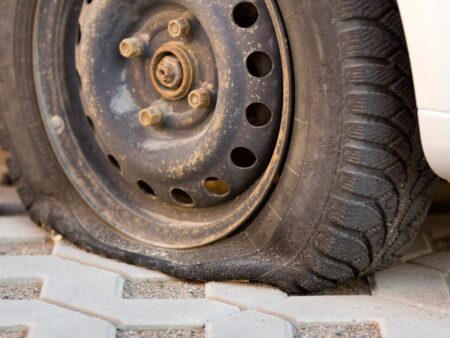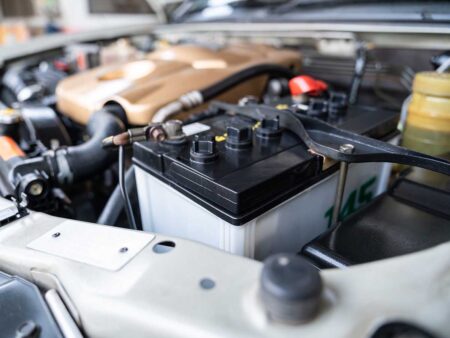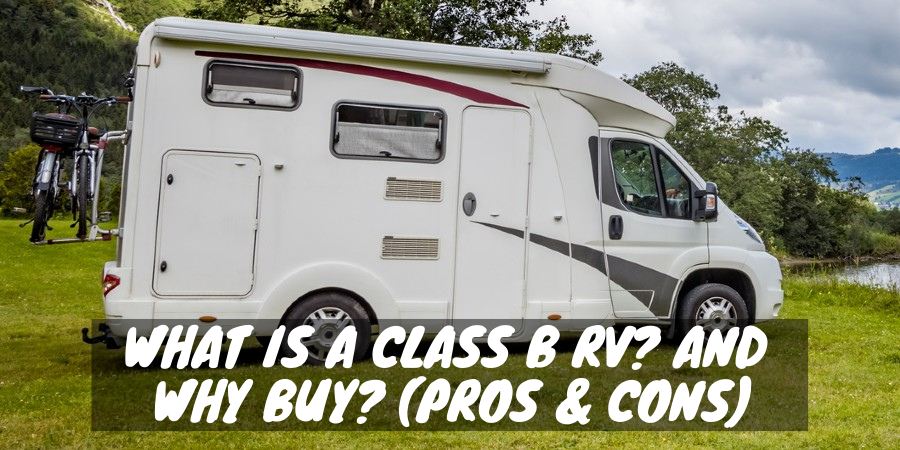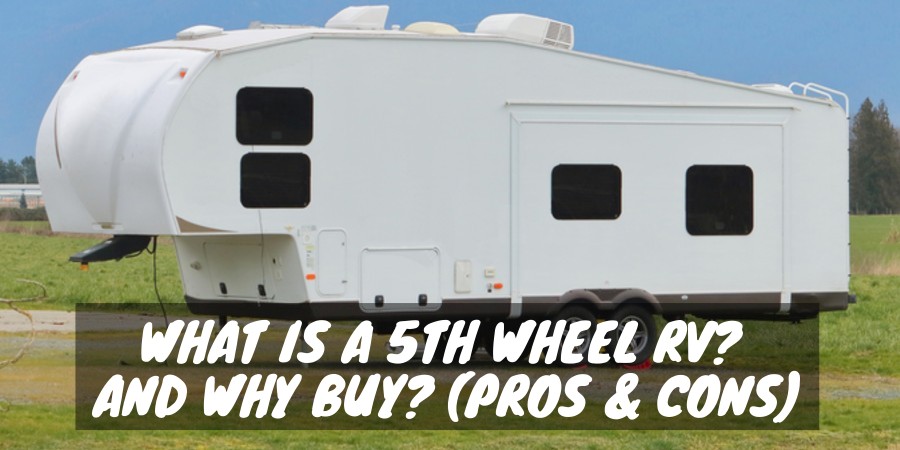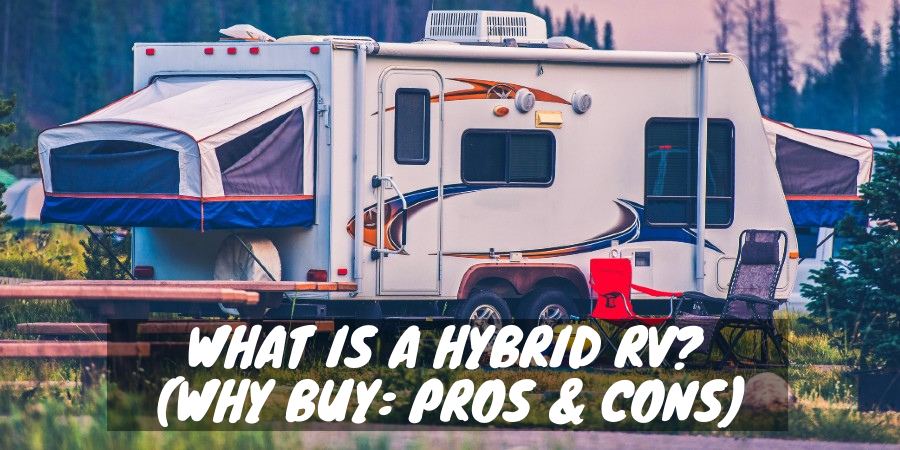RV vacations are fantastic, but not when the power goes out, or you want to camp off-grid, and you don’t have a generator for your 50 amp travel trailer, motorhome, or fifth wheel.
Buying the right generator that will support the electrical needs of a 50 amp RV can be confusing, as each family uses different appliances and devices than others. Most experts recommend a 4,000-watt generator as a starting point, but some RVers will need much more power.
In the following sections, I’ll provide a comprehensive guide to help you select the appropriate generator size for a 50-amp RV. This includes an overview of 50 amp electrical systems commonly found in recreational vehicles, an in-depth analysis of the power consumption of various RV appliances, a method to estimate your power requirements, key features to look for in an RV generator, and recommendations for some of the best models on the market.
With a robust and durable RV 50-amp generator, you’ll always have the electricity you require to operate your camper, so let’s jump in!
How Many Watts of Electricity Does an RV 50-Amp Service Provide?
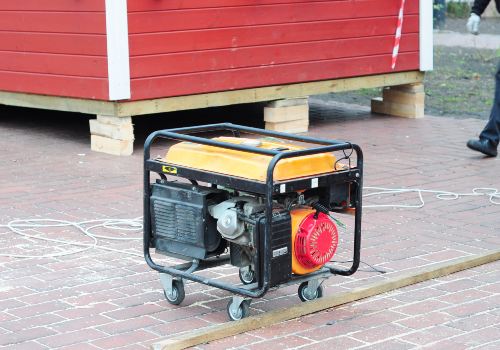
Many recreational vehicles feature 50-amp electrical service. Fifth wheels, Class A motor coaches, and large travel trailers have greater power needs than smaller 30-amp motorhomes or camping trailers, especially if they have two air conditioners.
An RV with a 50-amp service will provide 12,000 watts of electricity, which is a significant wattage increase from the 3,600 watts a 30-amp RV service offers.
You cannot use RV power cord adapters and alter this power flow.
For example, suppose you have a 30-amp travel trailer but need to use a 50-amp plug adapter because the 30-amp plug in the pedestal is missing or broken. In that case, you won’t magically have 12,000 watts of electricity, as your camper only can accept 3,600 watts of power.
If you own a 50-amp RV and need to use a 30-amp adapter for your plug-in, you will now only have 3,600 watts of power running to your camper.
Thankfully, the need to use adapters is rare. In all my years of full-time RV travel, I’ve only had to use them twice.
So, will you need to buy a 12,000-watt generator for your 50-amp RV?
The easy answer would be yes, but most RV owners don’t have the budget or spare weight capacity for such a purchase. In addition, it’s highly unusual to run all your camper’s appliances at the same time, so a 12,000-watt RV generator is rarely necessary.
To clarify what size generator is best for a 50-amp RV, you first need to look at what appliances are in your RV, which ones you rely on for camping comfort, and how often you use them.
How to Figure What Size RV Generator to Get for a 50 Amp RV
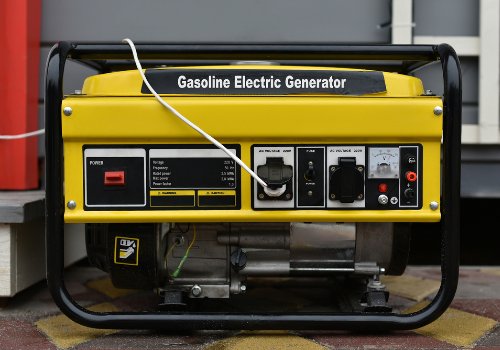
Before you start shopping for a generator to run your 50-amp camper, you have to record your normal appliance or power usage during your RV camping trips.
Once you determine which appliances you run, how often you use them, and which ones you run at the same time, you can then figure out how many watts of power are necessary to keep your 50-amp RV running when boondocking or if campground power goes out.
You also need to ask yourself what your goal is if you need to run the generator.
Are you only looking for enough power to run the refrigerator and coffee pot and charge your phone or computer if the power goes out? Do you want to run your air conditioner(s) and have full use of all your other RV amenities?
Your camping style plays a crucial role in what size RV generator you need. For example, people who love boondocking require a larger unit than someone who sticks to RV park shore power and only needs a backup power source for emergency use.
You want to buy a generator that will meet or exceed the maximum wattage you typically use when running your RV appliances, keeping in mind those you run simultaneously.
It would help to consider the starting wattage of an appliance, which can be quite a bit higher than the running wattage. If your generator’s output cannot exceed the power a device requires to start, like the AC compressor, it will be useless.
How to Calculate RV Appliance Total Wattage Needs
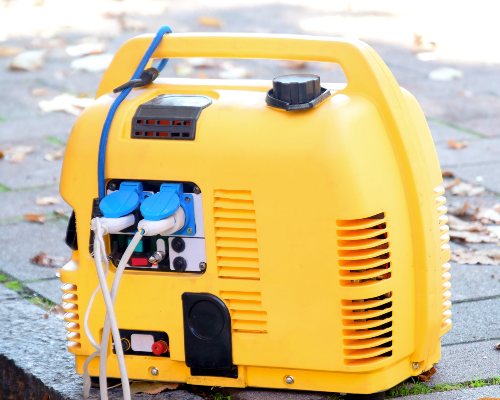
The list below provides a typical RV appliance wattage. Still, you’ll want to check your specific camper appliance models to get an exact figure if you want to ensure you’ll buy the correct size generator.
Remember to write down the starting wattage versus the running wattage of RV appliances, as this figure is more important.
Another significant factor in picking the correct 50-amp RV generator is the number of air conditioners you have. A single AC in a camper should run off a minimum of a 4,000-watt generator, but having two or even three ACs will require a more powerful and expensive unit.
RV Air Conditioner Sizes and Wattages
Here is a breakdown of different RV air conditioner sizes to help you begin your list of power needs for your 50-amp generator purchase.
7000 BTU
- Starting wattage: 1700 Watts
- Running wattage: 600 Watts
10,000 BTU
- Starting wattage: 2000 Watts
- Running wattage: 700 Watts
13,500 BTU
- Starting wattage: 2750 Watts
- Running wattage: 1250 Watts
15,000 BTU
- Starting wattage: 3500 Watts
- Running wattage: 1500 Watts
As you can see, if your 50-amp RV has two 13,500 BTU air conditioners you want to run off a generator, you’ll require at minimum a 5,400-watt unit.
Average RV Appliance Wattages
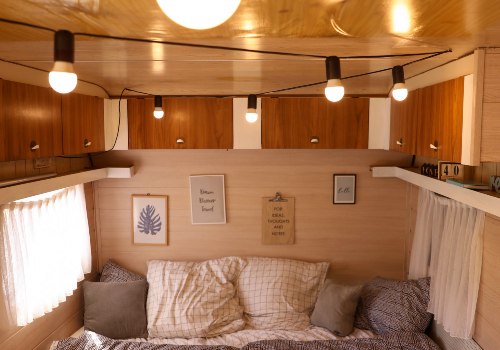
The air conditioner, refrigerator, and microwave are the three major RV appliances that draw the most power. Here is a list of all standard power draws with starting and running wattages.
Again, this list is for average RV appliance wattage requirements to use as a starting point to determine what size generator to get for a 50 amp RV. Always double-check these figures against your specific appliance model’s wattage ratings.
Microwave
- Starting wattage: 1500 Watts
- Running wattage: 1500 Watts
RV refrigerator
- Starting wattage: 600 Watts
- Running wattage: 180 Watts
Hairdryer
- Starting wattage: 1900 Watts
- Running wattage: 1800 Watts
Blender
- Starting wattage: 800 Watts
- Running wattage: 300 Watts
TV
- Starting wattage: 190 Watts
- Running wattage: 190 Watts
Single light (60 W incandescent/10 W LED)
- Starting wattage: 60/10 Watts
- Running wattage: 60/10 Watts
Electric grill
- Starting wattage: 1600 Watts
- Running wattage: 1600 Watts
Satellite receiver
- Starting wattage: 250 Watts
- Running wattage: 250 Watts
Coffee maker
- Starting wattage: 750 Watts
- Running wattage: 750 Watts
Laptop computer
- Starting wattage: 250 Watts
- Running wattage: 250 Watts
For more information on other RV appliances or devices, you may use this comprehensive list of appliance wattage draws from battery equivalents.
Finding Your Total RV Generator Power Wattage Total
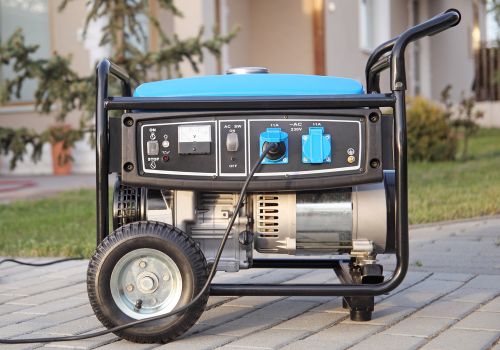
To calculate the total power or generator size necessary for a 50-amp RV to run the appliances, you need to consult your complete list of all the electrical components in your camper, along with how you normally use them.
For example, you may always be running your 10,000 BTU AC, fridge, a few LED lights, and television inside your RV but then decide to dry your hair.
You’ll need to account for the total start-up wattage required for all those appliances combined and will need the bare minimum of 4,720 watts (using the averages above) of power and need to buy a 5,0000-watt RV generator.
If you don’t mind the hassle of remembering to turn off the AC and television before turning on the blow dryer, you can get by with a 4,000-watt RV generator, as the power draw is only 3,750 watts.
A good rule of thumb, if your budget allows, is to add 1,000 watts to your final wattage-need total to accommodate extra appliances or devices you may add to your RV over the years.
Features to Consider Before Buying a 50 Amp RV Generator
Generator Wattage Output
All RV generators should state their maximum wattage output for starting and running power.
Using the calculations for your unique RV power needs, ensure you select a model that will meet or exceed your requirements.
Generator Weight
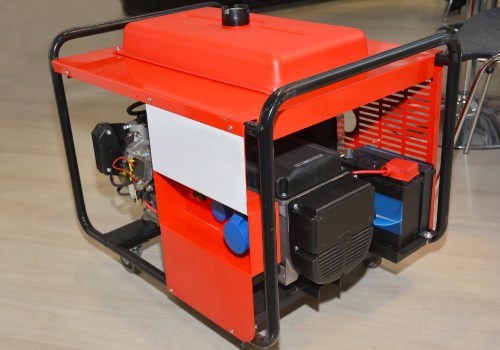
50-amp RV generators will be larger and heavier than models with less wattage output.
Depending on your RV type and gross vehicle or trailer weight ratings, you may need to restrict how heavy your generator is so it doesn’t push you over the safe limits for travel.
Heavy portable generators are also harder to lift into a pickup truck bed or move about once you reach your campsite, so look for a unit with wheels to make transport around the campsite easier.
Does It Offer a Parallel Connection?
Some generators offer parallel connections, which means you can hook up an additional generator to increase power output.
This type of generator is an excellent idea if you will have occasions when you need more power at your campsite or place of residence.
Generator Fuel Source
Generators can run on gas, propane, or diesel fuel. For an RV, it may be best to look at models that are “dual fuel,” meaning they can run on propane along with either gas or diesel.
You never know when you’ll have difficulty finding or transporting enough of a single fuel source when camping, so having an extra option to run your generator is very practical.
Want to Connect With a Community of Over 1,078 RV Enthusiasts?
If your motorhome or tow vehicle runs on gas, get a gas or gas/propane dual-fuel generator, and likewise, if you use diesel.
A propane-only RV generator has the advantage of longer shelf life of the fuel, and it’s free of odors and is often less expensive to purchase versus gas or diesel.
The downfall of a propane generator for RVs is that you must have a propane refill service within easy reach for long-term use if you’re boondocking or the power grid is out. Also, not all campgrounds offer propane onsite, so take this into consideration.
Generator Noise
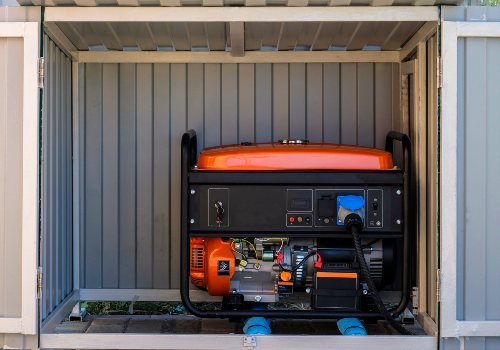
The last thing you want to happen at a campground is to annoy your neighbors or wildlife by running a noisy generator. As a result, some RV parks don’t allow generators or restrict their use to certain hours.
The best 50 amp RV generators should have a running decibel level under 70 to prevent issues. Unfortunately, the more powerful the generator, the more noise it makes, especially since portable units are not contained within a sound-buffering housing.
You can find some generators that claim to lower decibels under 60, which is a great feature, but often, this is only when the unit is in “eco” mode, which is less than the unit having a 50% or less load.
Be aware that the advertised running decibel level is not the actual noise the generator will make when running at full capacity.
Top 3 Generator Models For 50 Amp RV
Here are the best 50-amp RV generator models currently on the market. Most generator brands offer a range of sizes and wattage outputs so you can tailor it to meet your exact needs.
The key to a good generator for larger RVs is that it comes with an integrated 50-amp plug, like the ones below.
1. Pulsar G12KBN Heavy Duty Portable Dual Fuel Generator
- 12, 000 peak watts/ 9, 500 Rated watts (gasoline) & 10, 800 peak watts/ 8, 550 Rated watts (LPG)
- Dual fuel capability allows you to choose between gasoline & LPG fuel sources; great for emergency situations or natural disaster…
- The 457cc, single cylinder, 4-stroke, air cooled, OHV engine with electric start is protected by a durable powder coated frame
- A 8 gallon fuel tank gives you up to 12 hours of continuous operation at half load when running on gasoline
- (4) 120V 20A AC outlets, (1) 120V/240V 30A twist-lock outlet, (1) 120V/240V 50A outlet, (1) 12V DC output provide ample space for…
If you want a portable generator with max power and a 50-amp plug (30-amp as well), consider investing in this Pulsar Heavy-duty G12KBN model that features 9,500 Running Watts and 12,000 Peak Watts.
This dual-fuel generator can run for up to eight hours on propane or gasoline, making it the most convenient for RV travel.
The array of outlets, large fuel tank, wheels, handle, and reasonable price for such a powerful unit make this the top choice if you want to power your 50-amp RV fully.
The biggest downside of this model is the weight, which hits 209 pounds, so make sure you have the ability to move it before choosing this generator.
2. Firman P08003 RV Generator
- Performance Series
- Starting Watts – 10,000 Watts
- Running Watts – 8000
- Engine Brand – Firman 4 Stroke, 439 CC, 15 HP, 74dB
- Recoil/Electric/Remote Start
The gas-powered Firman PO8003 Generator is a workhorse that is RV-ready with 50-amp and 30-amp plugs.
The unit offers 8,000 running watts and 10,000 starting watts for plenty of power and a simple to operate electric or remote start feature.
This generator has plenty of outlets, a digital display, wheels, a rugged cage, quiet operation, and up to 16 hours of run-time per tank, which increases the value.
The downside of the Firman is the weight (217 pounds) and the price point, which may be outside of many budgets.
3. WEN DF1100T 11,000-Watt Dual Fuel Portable Generator
- Switch between gasoline (11,000 surge watts, 8,300 running watt) and propane (9,500 surge, 7,500 running) with the simple turn of…
- Voltage easily goes from 120V to 240V, perfect for transfer switches and emergency backup
- Electric start powers the 457cc 4-stroke OHV engine with the turn of a key
- 6.6-gallon tank provides up to 8.5 hours of half load run time
- Includes four 120V GFCI outlets (5-20R), a 120V 30A twist lock outlet (L5-30R), a 120V/240V 50A outlet (NEMA 14-50R), a 12V DC…
The Wen DF1100T Portable Generator is a bit less expensive than the two above but delivers an impressive amount of power so you can RV in comfort off-grid.
Key features of this model encompass its ability to operate on dual fuel, offering 11,000 starting watts and 8,300 running watts when using gasoline and 9,500 peak watts with 7,500 running watts on propane. Moreover, it provides added versatility with its voltage adjustment capability, ranging from 120v to 240v.
The WEN offers an electric start and low oil shut-off, and the large tank allows the generator to run up to 8.5 hours on a half load, and a full array of outlet choices lets you connect and power all types of devices.
The downside of the WEN is the weight, again making it challenging for one person to lift the unit.
Final Thoughts
The best generator size for a 50-amp RV is around 8,000 watts for general usage and 10,000-12,000 watts for big motorhomes, travel trailers, and fifth wheels.
I hope you find the information above valuable when shopping for a generator to power your 50-amp recreational vehicle.
The best 50-amp RV generator is easy to operate, reliable, and will make all your camping adventures more fun, safe, and comfortable no matter where you roam!
If you own a 30-amp RV, check out this article to find out the best size generator to buy.
Generator Sizing for RVs (Video)
"Man cannot discover new oceans unless he has the courage to lose sight of the shore."
-- Andre Gide

